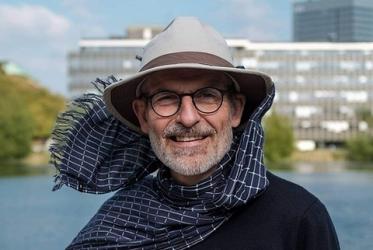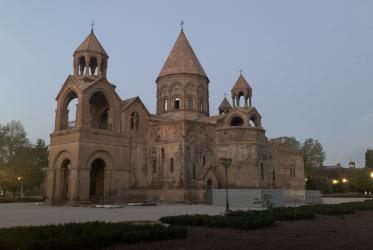Findings of the delegation sent by the WCC and CEC, 29 June - 2 July 1999.
Following the visits of delegations from organisations based at the ecumenical centre in Geneva to Novi Sad and Belgrade 16-18 April, and Macedonia and Albania 18-25 May, during the time of the NATO bombing, the World Council of Churches (WCC) and the Conference of European Churches (CEC) decided to send a delegation to Kosovo as soon as possible after the war. This visit took place 29 June to 2 July 1999.
The aims and objectives of the visit were:
- to strengthen first-hand contacts with the religious communities, in particular with the Serbian Orthodox Church, in Kosovo
- to gather information about the present situation, especially with regard to security and the implementation of human rights for all peoples in the region
- to assess the future role of churches and ecumenical bodies in establishing a civil society to discuss humanitarian aid
- to suggest mid-and long-term ecumenical action.
Findings and Conclusions
Humanitarian Aid. Wherever the ecumenical delegation went, the signs of war were highly visible. We met convoys of Albanian refugees returning home. According to UNHCR officials, 500,600 had returned so far and these were the ones who had some resources and a home to return to. In fear of revenge, Serbs are forced to leave the country, to live in ghettos or to seek refuge in monasteries under the protection of KFOR troops. It is feared that large parts of Kosovo are covered with land mines and unexploded devices that may take years or even decades to trace and remove. Accidents and new victims are reported daily, but the full scale of the problem is not yet clear. In all parts of the region we saw destroyed and burnt houses, including churches and mosques; the further north, the higher the degree of devastation. People of all ethnic and cultural backgrounds are suffering and lack food and medical supplies. According to the Muslim leader, Mr Naim Ternava, humanitarian aid for the region around Drenica is a high priority. Bishop Artemije referred to those Serbs that live in fortresses and are unable to move freely.
Humanitarian aid needs to continue and even be increased, especially in the light of the forthcoming winter, which starts in some parts of Kosovo as early as October. A sustained commitment to Kosovo by all aid organisations should be encouraged. ACT should continue to follow its principle of helping all those in need beyond religious or ethnic border-lines. Coordination among the many relief organisations present in Kosovo should be strengthened.
The ecumenical organisations should support the establishment of a UN Kosovo Mine Action Centre as well as the NGO mine clearance efforts.
Towards a multi-ethnic and multi-religious Kosovo. All of our contacts expressed their vision for a multi-ethnic and multi-religious Kosovo. The present situation, however, forces the ethnic Serbian population as well as the Gypsies/Roma to leave Kosovo. Though the KFOR troops do their utmost to bring about stability and security, they are unable to protect every civilian of the minority population. Serbs have either left (Prizren), live in fortresses, seek refuge in monasteries or are separated from the ethnic Albanian majority by the KFOR troops (Mitrovica). We have seen little evidence that Kosovo can remain multi-ethnic under the present circumstances.
We recommend that the KFOR and UN civil administration mandates which guarantee the security of ethnic minorities and all citizens be made explicit and that personnel and resources be provided to complete the task. Advocacy for the rights of Serbs and other ethnic minorities as well as maintaining a multi-ethnic and diverse Kosovo is critical. The number of KFOR troops originally planned (50,000) should be fully deployed in Kosovo and the civilian police force must immediately be oriented, trained and put to work in communities across Kosovo. We urge the demobilisation of small arms. All of our contacts based their hopes on a strong KFOR presence. The presence of international protection forces, however, cannot guarantee the peaceful coexistence of the different parts of the population.
Therefore we strongly recommend the establishment of a civil administration and the re-building of a civil society as soon as possible. The fact that the KFOR troops and the UN moved in too slowly allowed the UCK to take over the civil administration in many parts of Kosovo. We regard it as indispensable that the religious communities be invited and heard at the EU meeting on reconstruction scheduled for 31 July.
Even these efforts will not prove to be sufficient in the long-run to guarantee the peaceful co-existence of ethnic Albanians, Serbs and Gypsies in Kosovo. Therefore the ecumenical delegation tested with all contacts the possibilities for mediation and civil conflict transformation. The response was, however, that it would be much too early to think about initiatives to this effect. Nevertheless we want to encourage those organisations which have experience in this field to jointly explore possibilities in the mid-term future. It may be that some local communities can be identified, which are already working towards reconciliation, or that representatives from different communities can be invited for training courses in civil conflict management in the near future. It would be advisable for mediation efforts to link with intergovernmental bodies, such as the OSCE or SIMIC. In addition, we recommend that a collection of resource materials on peace, tolerance and reconcilation etc. should be collected in Serbo-Croatian and Albanian in order to duplicate and spread it in Kosovo as widely as possible. The Patriarch himself spoke about the need for public repentance and forgiveness. The Patriarch also reacted positively towards the idea of a pastoral meeting of the ecumenical community and the Serbian Orthodox Church. We therefore recommend that plans for a pastoral meeting be developed and an invitation be issued.
We heard from all religious communities about their commitment to a multi-ethnic Kosovo which respects human rights, justice and the rule of law. We therefore call on all nations to share intelligence data gathered during the conflict that might lead to indictments by the ICTY. We urge nations to provide additional professional staff (e.g. forensicists, criminal investigators) to support the efforts of the ICTY.
Reacting to a quickly changing reality. The visit of this delegation was too short to prepare a full assessment of the situation in Kosovo. Moreover, the situation is changing by the day, if not by the hour. At the same time the media seem to be losing interest. We saw several media representatives leaving Kosovo. We recommend that the ecumenical organisations strengthen their efforts to keep in close contact with the Serbian Orthodox Church and all visited contact persons. Additional contacts within the religious communities as well with other NGOs and the intergovernmental organisations will have to be made. The director of the Muslim Academy explicitly invited us to continue the dialogue and to also meet with all leaders of the Muslim community. We also suggest that another small delegation be sent to the region in August in order to re-assess the situation, to express solidarity with the peoples in Kosovo and to recommend appropriate actions to be initiated by the meetings of the Central Committees of WCC and CEC in September.
Members of the delegation
- Ms Penny Panayiota Deligiannis (Diaconia Agapes, Orthodox Autocephalous Church of Albania)
- Ms Linda J. Hartke (Church World Service and Witness, National Council of Churches of Christ in the USA)
- Mr Saso Klekovski (Macedonian Centre for International Cooperation)
- Mr Artan Kosti (Orthodox Autocephalous Church of Albania)
- Ms Miriam Lutz (Action by Churches Together)
- Rev. Rüdiger Noll (Conference of European Churches)
- Mr Huibert van Beek (World Council of Churches)
- OKR Klaus Wilkens (Evangelical Church in Germany)
- Mr Vladimir Shmaly (Russian Orthodox Church) could not join the team due to technical problems.




